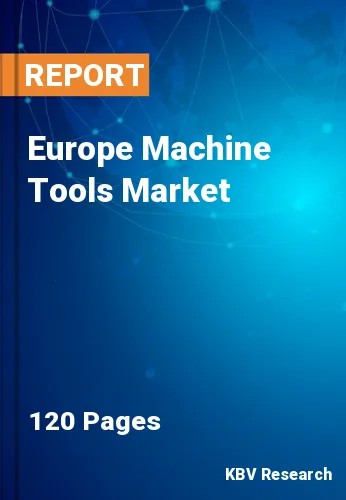The Europe Machine Tools Market would witness market growth of 3.4% CAGR during the forecast period (2021-2027).
Machine tool architectures are projected to play a key part in propelling the market forward. Machine tool manufacturers like DynaPath Systems, Inc. and MC Machinery Systems, Inc. are attempting to improve machine tool functioning by producing machines with automatic tool changing capabilities. The automatic tool changer, which comprises four tools in separate tool stations placed around the spindle, can change all of the tools in three seconds. Various countries are taking initiatives like Blue Philosophy, Blue Competence, and DEMAT at the same time. These endeavors are targeted at developing lightweight structures for machine tools.
Cutting fluids or coolants are utilized in various machine-tool operations to reduce the damaging effects of friction and high temperatures. In general, a coolant's primary duties are to lubricate and cool. The lubricating function is most necessary when cutting a screw thread on a lathe or with a tap; in production-grinding processes, the cooling function is most crucial. Water is a great way to cool down, but it corrodes ferrous metals. Although lard oil has good lubricating properties, it is prone to rancidity. One of the most common coolants is sulfurized mineral oil. The sulfur tends to keep work-related chips from welding to the tool's tip. Soluble oil, an oily emulsion freely miscible in water, is often used for grinding and sawing activities.
The leading vehicle manufacturers like Mercedes-Benz, Volkswagen, Audi, Ferrari, Porsche, BMW, Bentley, Fiat, Opel, Jaguar, and Aston Martin have a prominent presence in Europe. As a result, the vehicle industry is likely to continue to contribute to regional market growth.
After Germany, the United Kingdom, and France, Italy is the fourth largest European automobile market, with 1.91 million new registered passenger vehicles sales in 2018, a 3% reduction from 2017. 51.2 percent of vehicles sold were diesel, 35.5 percent were gasoline, and 13.3 percent were alternative fuel vehicles, with 6.5 percent LPG, 4.5 percent hybrid, 2 percent CNG, and 0.3 percent electric. The outlook for 2019 isn't much better, with the market anticipated to contract by another 3%. This is owing to a new eco-incentive system that rewards the purchase of non-polluting, but more expensive, models while penalizing the purchase of more polluting, but less expensive, models.
The Germany market dominated the Europe Machine Tools Market by Country 2020, and would continue to be a dominant market till 2027; thereby, achieving a market value of $6,504.6 million by 2027. The UK market is anticipated to grow at a CAGR of 2.5% during (2021 - 2027). Additionally, The France market would experience a CAGR of 4.1% during (2021 - 2027).
Based on Type, the market is segmented into Lathe Machines, Milling Machines, Laser Machines, Grinding Machines, Welding Machines, Winding Machines, and Others. Based on Technology, the market is segmented into Computer Numerical Control (CNC) and Conventional. Based on Sales Channel, the market is segmented into Direct and Indirect. Based on End-use, the market is segmented into Automotive, Aerospace & Defense, Construction Equipment, Power & Energy, Industrial and Others. Based on countries, the market is segmented into Germany, UK, France, Russia, Spain, Italy, and Rest of Europe.
Free Valuable Insights: The Global Machine Tools Market Size will Hit $96.8 Billion by 2027, at a CAGR of 4%
The market research report covers the analysis of key stake holders of the market. Key companies profiled in the report include Hyundai Wia Corporation (Hyundai Motor Company), Schuler Group GmbH, CHIRON Group, JTEKT Corporation, AMADA CO., LTD., Okuma Corporation, DMG Mori Co. Ltd., Komatsu Ltd., Georg Fischer Ltd., and Makino Milling Machine Co., Ltd.
By Type
By Technology
By Sales Channel
By End-use
By Country
Our team of dedicated experts can provide you with attractive expansion opportunities for your business.

